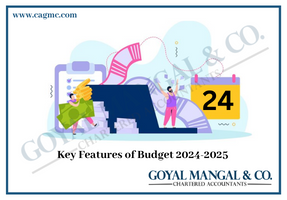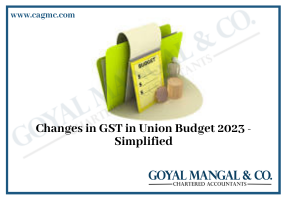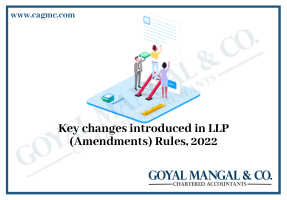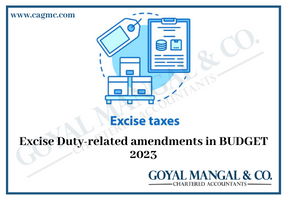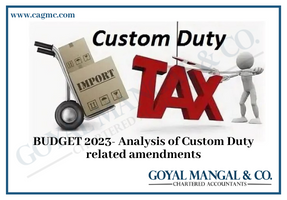
The Union Budget plays a crucial role in shaping the economic policies of the government and is eagerly awaited by Economists, business leaders, and ordinary citizens alike. It provides insight into the government’s economic priorities, plans, and strategies, for the future. In this article we will discuss about “Analysis of Amendment in CGST and IGST Act 2017 in Union Budget 2023”.
Amendments carried out in the Union Budget, 2023 related to GST except those in clause 142 (Schedule III of the CGST Act) will come into effect from the date when the same will be notified.
Quick Look
The Union Budget also known as Annual Financial Statements, is presented to parliament each year by the finance minister in the month of February. The Union Budget plays a crucial role in shaping the economic policies of the government and is eagerly awaited by Economists, business leaders, and ordinary citizens alike.
It provides insight into the government’s economic priorities, plans, and strategies, for the future pertaining to taxation, fiscal measures, infrastructure development, social welfare, agriculture, education, healthcare, and more.
As in this article we are going to analyse the amendments done in Union Budget 2023 In CGST Act, 2017 act IGST Act 2017, so let us have a brief look on the meaning of CGST and IGST.
What is Central Goods and Service Tax Act, 2017 (CGST)?
The CGST Act, 2017 (herein after referred as “CGST Act”) stands for the Central Goods and Services Tax Act. It is a part of the Goods and Services Tax (GST) regime introduced in India on 1st July 2017. The CGST Act defines the rules and regulations for the collection and administration of the central goods and services tax in India.
The CGST act has been enacted to make a provision for levy and collection of tax on intra-state supply of goods or services or both by the Central Government and the matters connected therewith or incidental thereto.
The CGST Act defines the provisions related to payment, registration, and filing of returns, as well as help us in determining the taxable value and the input tax credit mechanism. The Act also defines the penalties and offenses for non-compliance with the GST rules and regulations.
Overall, the CGST Act is a form of legislation that forms the backbone of the GST system in India, ensuring a smooth and efficient tax administration system for goods and services.
What is Integrated Goods and Service Tax Act (IGST) ?
The Integrated Goods and Services Tax Act, 2017 (hereinafter referred as “IGST Act”) is a tax law enacted by the Indian government in 2017 as a part of the Goods and Services Tax (GST) regime. The IGST Act governs the taxation of the supply of goods and services between states and union territories in India.
An Act to make a provision for levy and collection of tax on inter-State supply of goods or services or both by the Central Government and for matters connected therewith or incidental thereto.
The IGST Act also provides rules and regulations for the payment, registration, and filing of returns for taxpayers engaged in inter-state transactions. Its aims to simplify the taxation system.
Analysis Of Amendment in CGST and IGST Act 2017 as per Union Budget 2023
The Following are the amendments in CGST and IGST Act, 2017 and their impact on the industry and businessman as per Budget 2023.
Amendment in CGST Act 2017
The amendments are as follows:
- Section 10 Composition Levy: The proposed Amendment in Section 10 of CGST Act is to permit composition option to registered person who are engaged in supplying goods through electronic commerce operator. However presently the person engaged in supply of goods or services through e-commerce operator is not eligible for composition scheme.
The objective of the proposed amendment is to bring simplicity and to reduce compliance cost for the small taxpayers.
- Section 17 Input Tax Credit: As per the proposed amendment the availment of Input Tax Credit has been restricted in respect of supply of custom bonded warehoused good before clearance for home consumption by including the value of such transaction in the value of exempt supply. The present amendment is on the basis that as there is no output GST Liability for the taxpayers, there arises no occasion to claim ITC with respective to the said supply.
The said amendment of ITC restriction and consequent reversal will not be applicable in case of High Sea sales merchanting trade.
- Applicability of Input Tax Credit on Corporate Social Responsibility: The Union Budget proposes the claim of ITC for CSR expenses, that means the businesses can claim ITC for the GST they pay on Goods and Services they use for CSR. The goal of CSR is to ensure that the businesses are held accountable for the effects they have on their surroundings, economy, and society.
This move of government will encourage businessman to invest more in CSR activities but one thing to keep in mind is that the CSR activity must be in alignment with the primary business activity of the company.
- Section 23 Person Not Liable for registration: As per Section 23 of CGST Act, 2017 entities that are exclusively engaged in supply of exempted goods or services and an agriculturist to the extent of supply of produce out of cultivation of land is not liable for registration. But earlier there are controversial views on the same that if the above-mentioned entities fall under criteria of Section 24 that is compulsory registration, and then will Section 23 override section 24.
As per proposed amendment Section 23 is now proposed to be retrospectively amended w.e.f. 2017.and will override Section 24(compulsory registration). So now such entities will not be liable to registration even if they are governed by the provision of Section 24.
- Amendment in Section 37(Furnishing details of outward supply), Section 39(Furnishing of returns), Section 44(Annual Return): As per proposed budget the time limit for GSTR 1, GSTR 3B, and GSTR 9 filing has been proposed for registered person i.e., after the expiry of 3 years from the date of filing of said return, the registered person shall not be allowed to file GSTR 1, GSTR 3B and GSTR 9 unless it is specifically allowed by the government. This amendment is significant since return filing obligations are the core of further steps like the assessment by the department, so the further steps will not get delayed if the return are filed within the specified time.
- Amendment in Section 52(Collection of Tax at source): As per proposed budget the time limit for GSTR 8 filing has been proposed for the electronic commerce Operator i.e., after the expiry of 3 years from the date of filing of said details the electronic commerce Operator shall not be allowed file GSTR 8 unless it is specifically allowed by the government.
- Section 56 – Interest on Delayed Refund: As per proposed Union Budget if refund is delayed beyond the period of 60 days, then Interest will be calculated from the date of receipt of application till the date of refund.
This is to prioritize the interest of the taxpayers.
- Section 122 – Penalty for certain offences: As per proposed amendment in Union Budget, the Electronic Commerce Operator will be liable for penal provisions, in case of contravention of provision related to supply of goods or services made through electronic commerce operators by the composition taxpayers and unregistered person. The proposed amendment will lead the to efficient working from electronic commerce operator end, they will work with due diligence.
- Section 132 – Punishment of Certain Offences: As per proposed amendment following offences will be decriminalized.
- The person who Obstructs or prevents any officer in the discharge of his duties.
- Tampers with or destroys any material evidence or documents.
- Failure to provide required information.
Further, the monetary threshold for launching prosecution for the offences under the said Act is being increased from Rs. 1 crore to Rs. 2 crores, except for the offences related to issuance of invoices without supply of goods or services or both. Issuance of Invoice without supply of goods or services which can result in wrongful availment of refund or credit amounted to Rs.100 lakhs to 200 lakhs will be punishable with imprisonment up to 1 year.
The proposed amendment helps to gain confidence of investors, businessman and genuine taxpayers. It also indicates that government is focusing to stop the fraudulent activities.
- Section 138 – Compounding of offences: As per proposed Union Budget 2023 The amount of compounding of offenses has been reduced from Rs 20000 or 50 % to 150% of tax amount involved to Rs 20000 or 25 % to 100 % of tax amount involved except offence of fake invoices. Issue of invoice without the supply of goods or services or both has been excluded from compounding of offenses.
- Section 158 A – Consent based information sharing by a taxable person: As per the proposed Amendment important data will be shared with specified system, as the government may notify, with the consent of both supplier and the recipient. This will make the sharing of taxpayer information consent based during registration process or return filing process. Sharing of e – way bill and the specifics of e – invoices will also require recipient consent as per this proposed Budget.
This interface platform between GST department and other Government will help the taxmen in red – flagging the suspicious GST Numbers.
- Amendment in Schedule III: The Union Budget 2023 proposed the retrospective amendment of changes in Schedule III.
It proposes that certain activities will be treated neither as supply of goods nor supply of services w.e.f. 01/07/2017.
Certain activities are:
- Supply of Goods from place outside the taxable territory to another place outside taxable territory, High Sea Sales, and Supply of warehouse goods before their home consumption.
- If the tax has already been paid on the above stated supplies, no refund of such tax shall be available.
Amendments in IGST Act, 2017
The following are the amendments made in IGST Act, 2017:
- OIDAR Services: As per proposed Union Budget 2023 there is amendment in Sec 2(17) of IGST Act 2017, that is amendment in definition of OIDAR Services by excluding the condition of ‘’essentially automated and involving minimal human intervention’’ from the definition that helps in widening the scope of services.
- Amendment in Section 12: Section 12 – Place of supply of service where location of supplier and recipient are in India. This Section has been omitted as per proposed Budget where transportation of goods is to place outside India. This amendment specifies the place of supply of services by the transportation of goods to a registered person, must be the location of the recipient or must be the location at which the good are handed over to their transportation, irrespective of the destination of goods. This is in case when supplier and recipient of services are in India.
Miscellaneous Amendments in Budget 2023
Following are the miscellaneous changes proposed by government to the GST System in the Union Budget for 2023:
- Changes in GST Rates: Many GST rates have been proposed for change in Union Budget 2023.The GST rate on tobacco product has been proposed to be increased from 25% to 35%. The main reason behind the increase in rates on tobacco product including cigarettes is to reduce the consumption of tobacco product. GST Rate for Electric vehicle has been proposed to be reduced from 5% to 3%, the reduction of rates is to reduce the reliance of country members on fossil fuels.
- GST Compliance Simplification: The current system of multiple return submission has been replaced with a single GST Return in the proposal of Union Budget. Government has also proposed establishment of appeals system and faceless assessment for GST.
- GST Registration Simplification: The Union Budget 2023 proposes simplification in GST Registration as compared to earlier cumbersome registration process. Government proposed a system of Aadhar based authentication for GST Registration. This will help in growing the authenticity of GST Registration. Another system of instant GST Registration for new business has been proposed by the Government i.e., a self – declaration – based system. This will lessen the burden on the new businessman of GST Registration Compliance.
- GST Audit Introduction: For all taxpayers with a turnover of more than 10 crores Union Budget proposes the implementation of GST Audit. The audit will be carried by an independent auditor which will examine all the aspect of GST Compliance. This will help in reducing the GST Evasion.
- Measure to limit Tax Evasion: The Government had proposed various proposal to prevent GST Evasion. Government has proposed a way to track fake invoices by linking the RFID system to a new system for tracking the movement of goods known as the e – waybill system. The companies that are having a turnover of more than 50 crores, for them government proposed an e-invoicing system, as all the invoices will be electronically generated, thus reducing the chances of tax evasion as the invoices will be reported to GST network directly.
Conclusion
Several changes to the CGST AND IGST Regime have been proposed in the Union Budget 2023 with the goals of reducing evasion and simplifying compliance. These adjustments will facilitate economic expansion and ease of doing business in India. It is anticipated that with the introduction of GST Audits, simplification of compliance, proposed changes to GST Rates, measures to detect GST evasion and modification of GST Registration process, all these changes can lead to enhancement in GST Regime transparency and efficiency.
